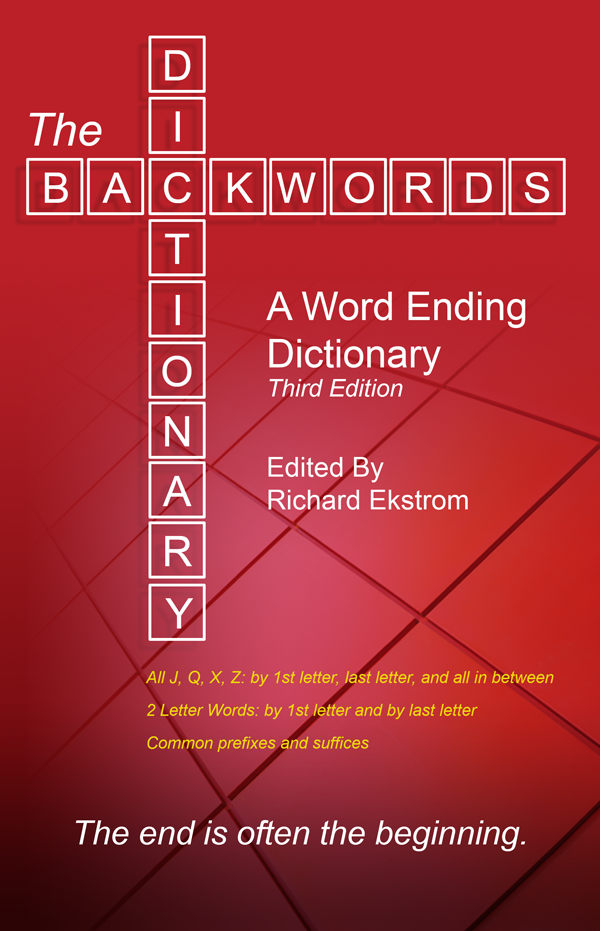Order Your Copy Of
The Backwords Dictionary
Now in an Updated and Expanded Third Edition!
A word ending dictionary for Scrabble©, Words with Friends©, crossword puzzles and other wordgames. Contains words sorted by last letter.
"About 35-40% of the time, a player wants to create a word ending in a specific letter. This, however, is not the way we traditionally think, and, not to mention, this is not the way dictionaries are sorted. In other words, in many situations, conventional dictionaries are not arranged in an easy to use manner. This dictionary solves that problem by sorting on the last letter of the word."
—Richard Ekstrom, Editor
The Backwords Dictionary
This dictionary was written primarily to enhance the enjoyment in playing the game of Scrabble® and Words with Friends®, although poets, rhymers, players of crossword puzzles and other word games may also find it useful.
In our family, Scrabble is a game we play for our enjoyment and amusement. As such, we are not opposed to modifying the rules to increase our enjoyment. For example, we might modify the number of tiles each player might have. Less experienced players would have more; while more experienced players would have less. This is an especially helpful practice when playing with an exchange student whose English is developing. At other times, if we want a fast game, every player will play with extra tiles, perhaps nine or ten.
And, we enjoy playing with a dictionary. We use a dictionary not because we want to challenge our opponent, but because we want to learn new words, find the perfect fit for a triple word score, reduce frustration when our memories are working slowly, and we've just come to enjoy playing that way.
The design for this dictionary evolved over a period of years. I kept notes on the size of words we typically made, what kind of situations posed difficulties in finding words, and great scoring opportunities missed. There were four major observations.
First, as casual players, we rarely created words in a single turn which were more than five letters long in total, unless it was done with a prefix such as ex, de, re, pre or un, or a suffix such as ed, ing, s or y. At the same time, most dictionaries are filled with lots of words longer than five letters. This causes visual clutter which is not only time consuming, but makes it harder to find words you might be able to actually use. In addition, the probability of being able to make some words is extremely small, for example, zyzzyva (a tropical weevil). The odds of having the only z, both y's, both blanks (for the other two z's), and a v is astronomical. This, of course, is an extreme example, and The Backwords Dictionary has its share of improbables, but by limiting the dictionary to words with a maximum of five letters, it is useful for its purpose.
The second observation, and the one for which the dictionary is named, is that about 35-40% of the time, a player wants to create a word ending in a specific letter. This, however, is not the way we traditionally think, and, not to mention, this is not the way dictionaries are sorted. In other words, in many situations, conventional dictionaries are not arranged in an easy to use manner. This dictionary solves that problem by sorting on the last letter of the word. Of course, you will still need a conventional dictionary for the 35-40% of the time you need a word beginning with a specific letter. (The other 20-30% are words where the focus letter is neither the first or the last.)
The third observation is that certain letters present special challenges. These are J, Q, X, and Z. These are the highest point value letters and, since there is only one of each, it is natural to want to optimize the opportunity. Hence, each of those letters has a chapter for all the words which have the individual letter, regardless of the position - first, last, or somewhere in the middle.
The fourth observation was that often a significant number of points could be scored with just two or three letters. Typically there were two parts to this observation: taking advantage of a difficult to get at multiple value square and, making two or even three words simultaneously. The key is two letter words. They let you fit into tight spots, and, if you can run a couple of them alongside another word, you will often get a surprising number of points. Knowing two letter words is also very valuable at the end of the game when you want to use up your tiles, but don't want to settle for just two points.
Purists may reject the idea of using a dictionary, but for us it is a lot of fun.
I hope you enjoy the game from this different perspective.
Richard Ekstrom
Pittsburgh, Pennsylvania
About the Editor
 Richard Ekstrom is a business consultant specializing in creative problem solving. He has played Scrabble for as long as he can remember. The germination of the idea for this dictionary was initially formulated at his summer cottage. In those ancient times, before cable TV, there were few stations on broadcast TV and reception was so problematic that for many years the cottage did not even have a TV. Everybody played a lot of Scrabble, especially when it rained. It was a multigenerational pastime. Richard and his wife live in Pittsburgh and enjoy biking, tennis, cooking and reading.
Richard Ekstrom is a business consultant specializing in creative problem solving. He has played Scrabble for as long as he can remember. The germination of the idea for this dictionary was initially formulated at his summer cottage. In those ancient times, before cable TV, there were few stations on broadcast TV and reception was so problematic that for many years the cottage did not even have a TV. Everybody played a lot of Scrabble, especially when it rained. It was a multigenerational pastime. Richard and his wife live in Pittsburgh and enjoy biking, tennis, cooking and reading.
Email the editor: info@backwordsdictionary.com





